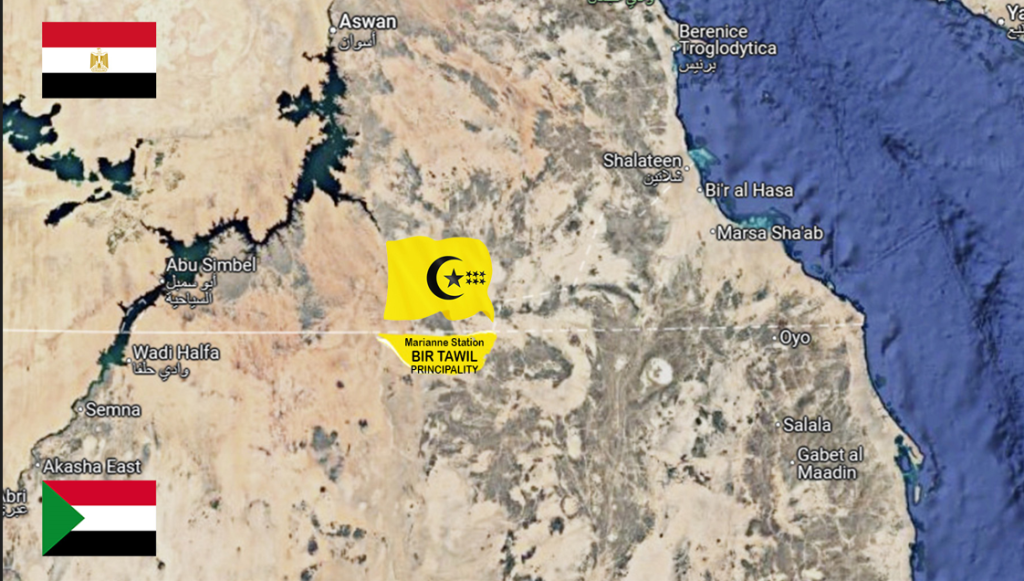The first guide dedicated to the Principality of Bir Tawil has been presented to the international press, shedding light on a forgotten nation.

The Intergovernmental Organization, Unrepresented United Nations (UUN) has taken a significant step by presenting the first official guide to the Principality of Bir Tawil, a unique territory that challenges traditional notions of sovereignty. This guide, titled Principality of Bir Tawil: History of a Forgotten Territory and written by H.S.H. Giovanni Caporaso Gottlieb, provides an in-depth and well-documented exploration of the historical, legal, and cultural complexities of this enigmatic enclave situated between Egypt and Sudan.
Bir Tawil is a unique region in the world, located in the Nubian Desert between Egypt and Sudan. Spanning approximately 2,060 square kilometers, it stands out as one of the few areas on the planet classified as terra nullius, meaning it is not formally claimed by any sovereign state. This singular status stems from colonial decisions made by Britain in the late 19th and early 20th centuries when it administered both territories.

The Principality of Bir Tawil has captured global imagination for being a terra nullius—a territory with no recognized sovereignty. This peculiar status is a direct result of British colonial decisions during that era. In 1899, Britain established a clear border along the 22nd parallel, dividing Egypt and Sudan.
However, a subsequent modification in 1902, based on practical administration and the land-use patterns of local tribes, left Bir Tawil in legal limbo. While Egypt and Sudan contest the fertile Hala’ib Triangle region, Bir Tawil remains a forgotten space.
This guide goes beyond being a simple historical account. It provides a window into the innovative project spearheaded by the author, who is also the Regent Prince of the Principality. H.S.H. Giovanni Caporaso Gottlieb has spent years developing the Marianne Station 1 project, a cornerstone of his vision for Principality.
A Futuristic Sustainability Project in the Desert

The settlement project in the Principality of Bir Tawil is an ambitious model of sustainability and self-sufficiency at the heart of the Nubian Desert. It aims not only to establish a settlement in Bir Tawil but also to demonstrate that even the most inhospitable environments can become hubs of innovation and harmonious coexistence between tradition and technology.
Tourism in Bir Tawil, a nearly unknown territory situated between Egypt and Sudan, is emerging as a unique offering that combines adventure, sustainability, and cultural exploration. Spanning 2,060 square kilometers and classified as terra nullius due to its unclaimed status, this desert region presents an unprecedented opportunity to develop a tourism model that values both the environment and the traditions of the nomadic tribes inhabiting the area.
The concept behind tourism in Bir Tawil is intrinsically tied to its geography, its historical, and its legal uniqueness. On the one hand, its isolation makes it a point of interest for travelers seeking authentic and exclusive experiences. On the other hand, its unclaimed status allows for innovative approaches to integrating tourism activities into a pristine environment, emphasizing sustainability and cultural preservation.
The proposal includes a unique access experience, with routes starting from Aswan, Egypt. Known for its rich historical heritage, Aswan serves as a gateway for travelers to venture into the Nubian Desert. The journey to Bir Tawil takes place in off-road vehicles, offering an immersive adventure. Along the way, tourists can enjoy breathtaking, desolate landscapes, guided by locals who share their deep knowledge of the environment.
Adventure and Cultural Tourism
Tourism in Bir Tawil focuses on activities that highlight the desert environment and the lives of local nomadic tribes, such as the Ababda and Bishari. These communities, which have inhabited the region for centuries, provide visitors with the opportunity to learn their traditional survival practices, including water conservation techniques and resource management.

Visitors will experience something unique and exclusive, taking photos with the nomads and the Bir Tawil flag. Upon entering the territory, their passports will be stamped with a Bir Tawil entry seal, turning their journey into a one-of-a-kind adventure.
To ensure tourism does not harm Bir Tawil’s fragile ecosystem, the project is grounded in sustainability principles. This includes using renewable energy sources such as solar panels and advanced technologies to harvest water from the air through condensation systems. These initiatives aim to balance visitor influx with the preservation of the environment and local culture.
With its blend of mystery, history, and distinctive landscapes, Bir Tawil has the potential to become a landmark destination for travelers seeking to venture beyond conventional routes. This project offers a golden opportunity to establish a model of responsible tourism that respects and values both nature and the traditions of its inhabitants. In a world where untouched spaces are increasingly rare, Bir Tawil provides a chance to explore what it truly means to navigate a unique and unspoiled territory.
The development of a tourism project in Bir Tawil stands out not only for its distinctive nature but also for its strategic collaboration with Egypt’s Ministry of Tourism and Antiquities. This partnership seeks to transform this remote territory into a sustainable tourist destination that benefits Bir Tawil while complementing Egypt’s flourishing tourism sector.
Egypt: The Leading Tourism Destination in Africa
Egypt, renowned for its rich history from the pyramids to the temples of Luxor, has long been a global tourism epicenter. In recent years, the country has worked to diversify its tourism offerings, incorporating new experiences that appeal to travelers interested in adventure tourism and sustainability. Bir Tawil, due to its proximity to Aswan and its unique status as a terra nullius, presents a strategic opportunity in this expansion.

Collaboration with the Ministry of Tourism and Antiquities aims to ensure that access to Bir Tawil from Egypt is safe, organized, and compliant with local regulations. This approach seeks to maximize the economic and cultural benefits for both Bir Tawil and Egypt.
The project aligns with the ministry’s efforts to strengthen the region’s tourism infrastructure, improving connections from Aswan and offering visitors an ideal starting point for exploring the Nubian Desert.
Aswan, a city rich in cultural heritage, serves as the hub for this collaboration. Tourists venturing to Bir Tawil will depart from this historic city along safe, organized routes designed to minimize environmental impact. Along the way, trained guides will provide insights into the desert’s landscapes and local cultures, establishing a cultural bridge between Egypt and Bir Tawil.
The Ministry of Tourism and Antiquities also plays a key role in the international promotion of this project. Its support ensures that tourism in Bir Tawil is developed under high standards of quality and sustainability, positioning the region as a model of collaboration between an established nation and an unclaimed territory. This partnership further solidifies Egypt’s reputation as a leader in adventure tourism, attracting travelers seeking unique experiences in extreme environments.
Sustainability and Technology as a New Concept of Tourism

Sustainability is at the core of the tourism project in Bir Tawil, with advanced technologies such as solar panels and atmospheric water collection systems being implemented to minimize environmental impact. Renewable energy systems, such as solar panels and atmospheric water collection technologies, ensure that tourism activities do not disrupt the desert’s fragile ecological balance. Moreover, local communities are actively involved in the project to ensure their participation is both respectful of their culture and beneficial to their livelihoods. The collaboration with nomadic tribes such as the Ababda and Bishari highlights their invaluable knowledge of desert life and environmental preservation systems. These tribes serve as a testament to resilience and adaptation in one of the world’s most extreme environments.
The synergy between Bir Tawil and Egypt benefits both entities while setting a precedent for how unclaimed territories can be integrated into global tourism initiatives sustainably. This project not only aims to attract tourists but also aims to strengthen cultural and economic ties between Bir Tawil and Egypt, showcasing how cooperation can transform a forgotten territory into a flagship destination.
Marianne Station 1 becomes a focal point for the integration of ancestral cultures and the latest technologies designed to address climate and resource challenges. It embodies the convergence of ancient traditions with innovative solutions, promoting sustainability while celebrating the heritage of the region’s nomadic communities.
In an increasingly globalized world, the story of the Principality of Bir Tawil raises essential questions about borders, sovereignty, and the enduring impact of colonial decisions. The guide documents the territory’s past while opening the door to a reimagined future where territories like Bir Tawil can become models of sustainability and innovation.
The Guide Published by Lulu.com in Print and Digital Formats
The guide, Principality of Bir Tawil: History of a Forgotten Territory, is available in both physical and digital formats. It invites readers to explore the complexities of this unique territory while engaging with innovative ideas about coexistence and sustainability.
This launch marks a milestone in the effort to bring attention to the stories and projects of marginalized territories, transforming them into examples of what can be achieved through creativity, respect, and determination.
The guide is also distributed internationally, including availability on Amazon, and can be purchased from the official website of the Principality of Bir Tawil.
For more information, visit www.birtawilprincipality.org or contact info@birtawilprincipality.org
Media Contact
Company Name: Bir Tawil Principlality
Contact Person: S.A.S.
Email: Send Email
Country: Egypt
Website: https://www.birtawilprincipality.com/
